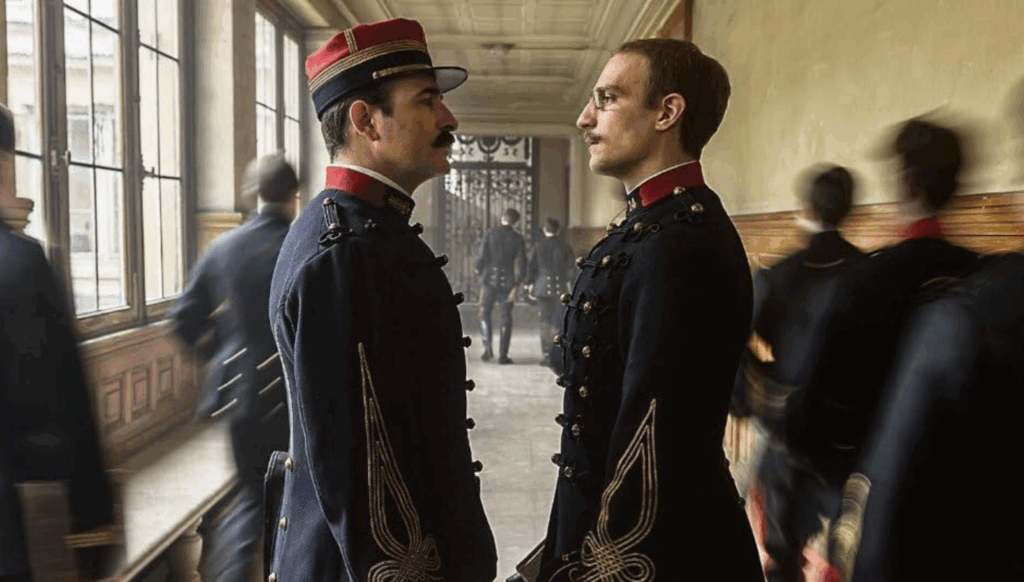Over 130 years after he stood trial for espionage, Jewish Captain Alfred Dreyfus made headlines last month when French President Emmanuel Macron declared July 12 the date the country would remember him and the antisemitism that led to his imprisonment. This presidential declaration follows on the unanimous vote of France’s National Assembly that agreed to raise his rank to brigadier general. These long overdue acts should also spur Americans to reflect on what happens when Jews become the battlefield in a political war that threatens to tear their nation apart.
Fortunately, they will have the opportunity to do so starting Friday when Roman Polanski’s “An Officer and a Spy,” winner of the 2019 Venice Film Festival Grand Jury Prize, finally gets its U.S. premiere at New York’s Film Forum.
Released in Europe in 2019, the movie never came out in the United States for a range of reasons including the pandemic and new sexual assault allegations against Polanski, who was already a fugitive from justice in the United States after fleeing the country in 1978 before being sentenced for having unlawful sexual intercourse with a minor.
But despite the scandal that surrounds him, Polanski is a master filmmaker, and as scholars whose work has centered on Dreyfus, we can recommend “An Officer and a Spy” despite its shortcomings that we will discuss.
The film revisits the Dreyfus Affair, which plunged France into crisis in the 1890s because it raised fundamental questions about the rights of individuals — and the place of minorities — within the modern liberal state.
The affair began in 1894, when the Jewish officer was convicted of selling military secrets to Germany and banished to Devil’s Island, a brutal prison off the coast of South America. When an antisemitic career officer named Georges Picquart discovered proof of Dreyfus’s innocence in 1896, the army tried to silence him. After the novelist Émile Zola publicized the injustice in a blockbuster newspaper article, France then found itself on the verge of civil war, with half the country devoted to seeking justice for Dreyfus and the other half dedicated to defending the army that had framed him. Brought back for a second trial in 1899, Dreyfus was found guilty again before the French president pardoned him in the face of international outrage. Dreyfus was eventually exonerated in 1906 and reintegrated into the army.
Polanski’s film opens with the spectacle of Dreyfus’s public degradation ceremony in the courtyard of the École Militaire in 1895. Polanski’s fidelity to the historical record and attention to detail in the sets and costumes of this lavish production are impressive, bringing the past to life with stunning accuracy. The fact that so many of the original locations that served as a backdrop to the affair are still intact reminds us how little has changed between Dreyfus’s time and our own, including the passions that animated the populace. With battalions standing at attention all around him, Dreyfus has his insignia stripped from his uniform and his sword broken in two, while a crowd of Parisians behind the gates yell, “Death to the traitor! Death to Judas!”
After this dramatic opening scene, Polanski barely focuses on Dreyfus at all. This is Picquart’s film: He is the main protagonist, present in nearly every scene. The decision to make the antisemitic Picquart (played suavely by Jean Dujardin) the hero reflects much of the historiography, which has long relegated Dreyfus to the sidelines.
To be sure, Picquart deserves praise for pursuing the truth despite his prejudices unlike his colleagues. But it was only thanks to Dreyfus’s remarkable will to survive that truth and justice emerged victorious — yet the film almost completely neglects Dreyfus’s experience.
Apart from one scene in which Picquart reads a letter that Dreyfus wrote from Devil’s Island, no effort is given to portraying Dreyfus’s inner life. Indeed, the film portrays Dreyfus as a robotic figure who does not seem to comprehend the social and political forces arrayed against him. Likewise, his heroic wife Lucie does not utter a single line of dialogue in this film whose only female character is a married woman, played by Emmanuelle Seigner (Polanski’s wife), as Picquart’s love interest.
The last scene of the film is perhaps the most interesting. Promoted to brigadier general, Picquart is now the minister of war, having risen to the very top of the military hierarchy thanks to his role in the affair. Dreyfus has been exonerated but not promoted to the rank he should have had if the army counted his years spent on Devil’s Island. In 1906, Dreyfus asks Picquart to rectify the situation. Picquart refuses, explaining that he doesn’t want to risk angering the anti-Dreyfusard coalition. Political considerations are now more important to Picquart than justice.
It is a shame that Louis Garrell plays Dreyfus as such a rigid, unsympathetic character because the audience might come away from the film thinking that Dreyfus was ungrateful to Picquart, whereas it is in fact Picquart who failed to recognize how much he owed to Dreyfus. The final scene also suggests that Picquart’s antisemitism may have been more persistent than we at first assumed, a useful lesson in our current moment, when some who pose as the Jews’ biggest defenders also do or say things that are blatantly antisemitic.
This is an extremely well crafted film, one that calls much needed attention to a vital historical moment, but it makes little effort to explain the antisemitism that engendered the affair. This is surprising given Polanski’s own experience as a Holocaust survivor (he was hidden as a child, while his mother was murdered in Auschwitz and his father narrowly survived Mauthausen). It is also especially regrettable because antisemitism is once again at the center of debates over the nature of liberal democracy.
As scholars, we urge American Jews to heed the key lessons of the Dreyfus Affair: Weak and corrupt democracies often use antisemitism to further a variety of political goals; democracies cannot thrive if they allow political considerations to trump the rights of individuals; and justice is always worth fighting for, even when it is not politically expedient. They are lessons that Roman Polanski’s film could have imparted more forcefully, but ones that we can extract nonetheless.
Keep Jewish Stories in Focus.
(JR) has documented Jewish history in real-time for over a century. Keep our journalism strong by joining us in supporting independent, award-winning reporting.
is a professor of American Jewish history at Columbia University.

is a professor of French at Yale University, specializing in the literature and culture of nineteenth-century France.
The views and opinions expressed in this article are those of the author and do not necessarily reflect the views of (JR) or its parent company, 70 Faces Media.




